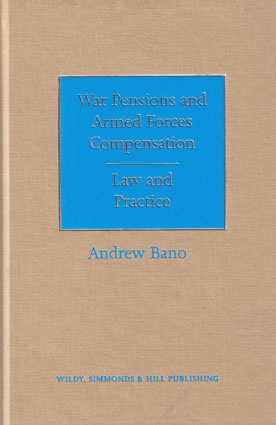
With a foreword by Sir Ernest Ryder, Senior President of Tribunals </p> <p. War pensions law contains a number of unique features, in particular, the onus on the Secretary of State to disprove entitlement to benefit beyond reasonable doubt. Although the war pensions scheme has now been replaced by the armed forces compensation scheme, claims continue to be made under it in respect of new conditions and in respect of deterioration in the condition of claimants already in receipt of awards.</p> <p> The armed forces compensation scheme, which was introduced in 2005, proved controversial, particularly against the background of the very serious injuries sustained by members of the armed forces serving in Afghanistan, and was substantially amended in 2011 as a result of a review of the Scheme carried out under the chairmanship of Lord Boyce.<p> <p> This book is written by an acknowledged expert in the field and provides for the first time an indispensable reference work covering all aspects of war pensions and armed forces compensation law and practice. The book traces the history of both schemes and provides a detailed commentary on the provisions of the Service Pensions Order 2006 and of the Armed Forces Compensation Scheme 2011, as interpreted by the nominated judges and by the judges of the Upper Tribunal and the appellate courts. The book covers the procedure for making a claim, bringing an appeal, and practice and procedure before the First-tier Tribunal (in England and Wales), the Pensions Appeal Tribunals (in Scotland and Northern Ireland), and the Upper Tribunal.<p> <p> <i>War Pensions and Armed Forces Compensation: Law and Practice</i> is an authoritative and comprehensive analysis of the legal principles underlying entitlement to compensation for those injured or killed in the service of their country. It is designed also to be a practical and accessible guide for all those concerned in bringing and dealing with war pensions and armed forces compensation claims and appeals.</p>